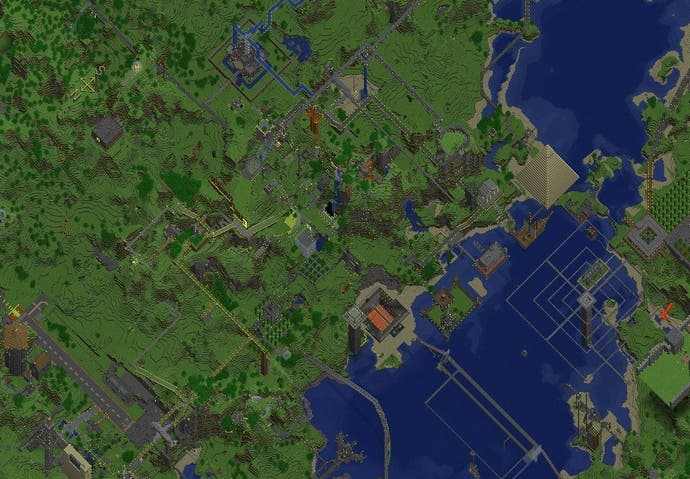Games of 2010: Minecraft
Built to rule.
Following the media trajectory of this free-form building and survival game has almost been more compulsive than Minecraft itself. Watching that slow burn from lo-fi obscurity to darling of indie sites to mainstream PC gaming acceptance to woah-hey-everywhere has been an ambient pastime for 2010. That was before the game even hit beta status.
It's been a lesson, I hope, for gamers and games critics who look down on anything indie (unless, of course, it's neatly packaged up and validated for them by Microsoft or Sony approval).
When its name first began to creep into headlines, I was witness to a shocking amount of sneering from both gamers and industry colleagues who really should know better. "What's this Minecraft thing then? Some indie rubbish?" It was dismissed because of its graphics, because of its name, because it focused on construction rather than destruction, because it was made by one guy, because it was on PC...
It was dismissed until it was successful enough that those same critics who had peevishly ignored it finally realised they were going to look like cretins if they couldn't offer comment on it. And hey, suddenly Twitter was alight with bon mots.

Does the mentality that, unless a game comes from a big-pig publisher, it's a stinker really still govern so? Come on! You simply don't have the right to sneer at all those cynical Call of Duty clones all the big boys are working on unless you're also actively supporting something that is different. It doesn't matter if you like it or not. You just need to be glad that it exists. That it can exist, despite the ongoing efforts of large corporations to make gaming a walled garden.
Minecraft proved that attending every industry party in town and endlessly posting expensive trailers doesn't achieve what it used to. The games business has changed. The world's appetite for games has changed.
Minecraft is but one of a great many games to break the old rules, but it did it so subtly and yet so massively that it can't help but stand above the others. Its ease, its cheer, its immediate appeal in both appearance and concept, saw it bust into the global gaming consciousness and achieve incredible success for its creator, Markus Persson. It didn't know its place. It didn't realise it was supposed to be small and obtuse and obscure and only for neckbearded, bespectacled PC gonks. It had the temerity to be something that anyone could play, and anyone could adore.

